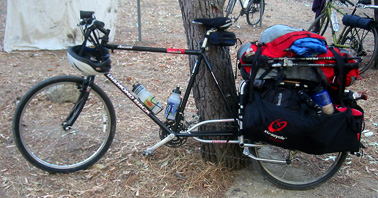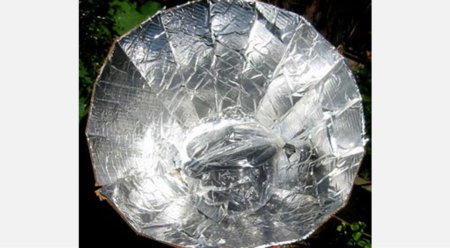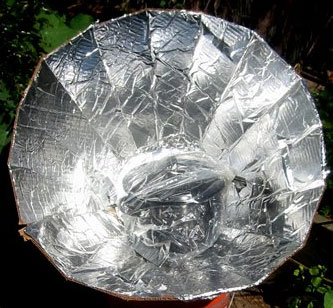Some Tips for Solar Cooking

The following post comes from author and urban homesteader, Erik Knutzen. I recently had the pleasure of working with Erik on a talk he gave at Patagonia Ventura about urban farming, vegetables, chickens, hooch, bicycles and cultural alchemy.
I’m a big fan of backpacking sufferfests, which often involve a long drive followed by hiking thousand of feet up and over challenging, rocky terrain. The sense of accomplishment and breathtaking scenery is always worth the effort, but something is also to be said for an alternate camping scenario we’ve taken to recently, involving loading up our cargo bike (the amazing Xtracycle) and biking to our destination, all the while carrying almost as much as we would car camping. After rolling into our campground, we’ll spend the weekend kicking back at the campsite, taking it easy and pretty much not going anywhere or doing anything. With the carrying capacity of the cargo bike, we can get fancy with the food and libations, allowing us to skip the usual dehydrated camping chow.
These sittin’ around type of trips, or even a lazy Sunday afternoon at home, are the perfect occasion to deploy a solar cooker. Best of all you can build a solar cooker yourself for pennies out of cardboard and aluminum foil. For some foods, such as rice, it’s actually easier to cook with a solar cooker than it is on a stovetop. Put some rice in a pot, place the pot in the solar panel cooker, stick it out in the sun and two hours later you have lunch.
One of our favorite designs is the “Parvati” solar cooker with plans designed by Shobha Ravindra Pardeshi. Pardeshi, who runs an “appropriate technology” company with her husband in India has another design for a similar dish-shaped cooker. Solar cookers such as these have enormous potential to decrease deforestation caused by the never ending search for cooking fuel that occurs in developing countries. Solar cookers can also help us in affluent countries to cut our reliance on fossil fuels such as natural gas. A phenomenal resource for free plans for all kinds of solar cookers is the Solar Cooking Archive.
For the Parvati cooker, we cut the cardboard according to the plans, and affixed the aluminum foil with spray glue. We use a black enamel pot to better absorb the heat of the sun’s rays, and wrap it in a roasting bag to increase the efficiency of the cooker. Temperature in the pot easily goes over 180º F, the point at which food begins to cook. The two hour cooking time, for rice, is much longer than it would take on a conventional stove, but with a solar cooker there is no danger of burning. In the northerly parts of the world, panel cookers like this one can be used only in the late spring through the early fall–when your shadow is shorter than you are.
Don’t feel like cutting up cardboard and gluing aluminum foil? You can also use an auto windshield shade as a solar cooker. Best of all, the windshield shade solar cooker folds up easily for easy stowing in your bike’s rack.
Consider a solar cooker a kind of low-powered crock pot for lazy and cheap people–good for things like rice, beans, soups and stews, but not so good for sautéing. And remember to be careful handling the pot as the concentrated rays of the sun are hotter than you think! Cooking with solar power, opening up that tasty steaming hot pot of rice, reminds us of where all energy on this earth ultimately comes from, the life-giving heat of our sun.


